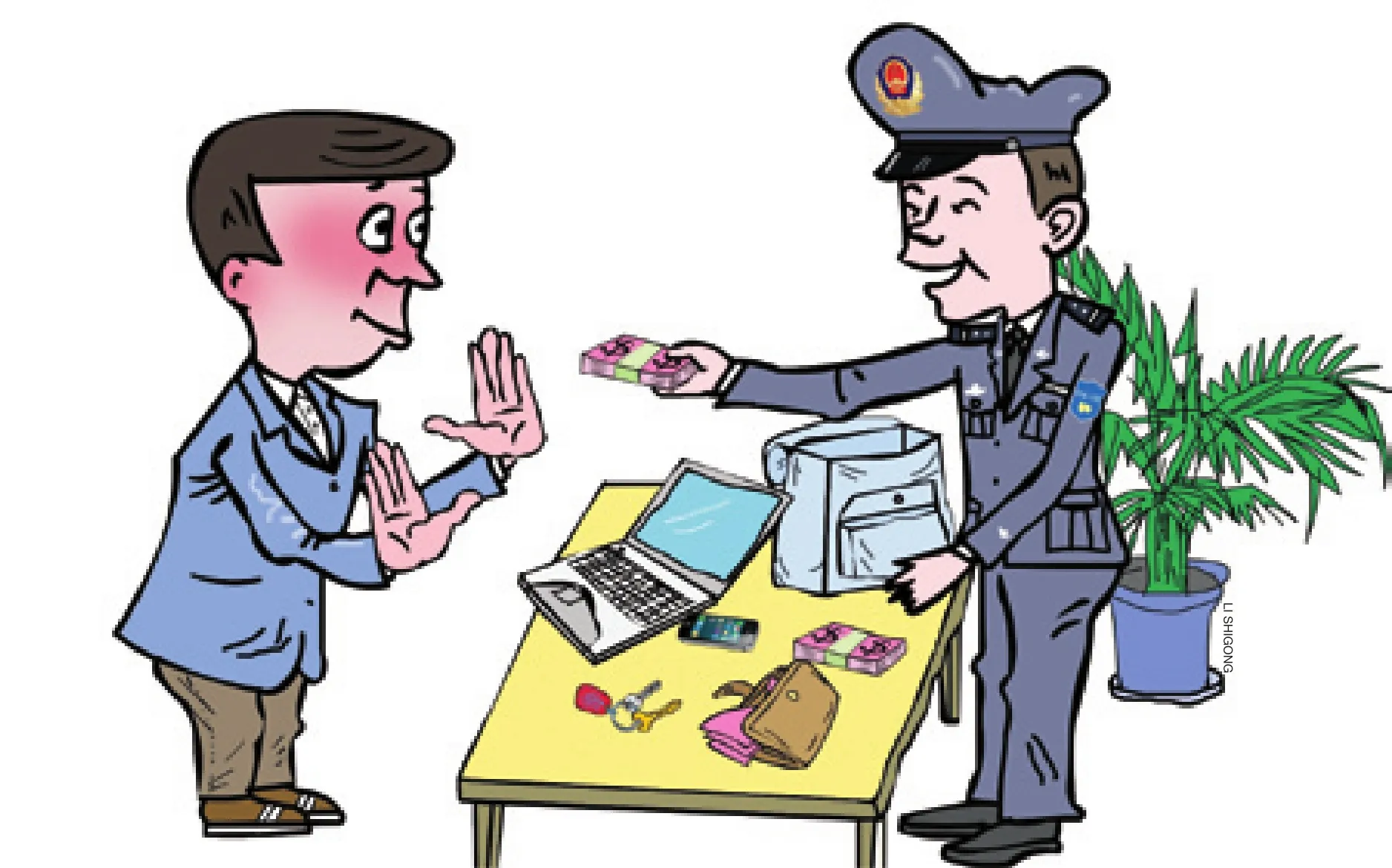Returning Lost Property,For Free or for a Fee?
Returning Lost Property,For Free or for a Fee?

LI SHIGONG
People who return lost property to the owner are expected to be rewarded,according to a draft regulation of Guangzhou, capital of south China’s Guangdong Province.
The regulation, which is still soliciting public opinion, says that owners of lost property are encouraged to give finders 10 percent of the value of the lost property as a reward before taking the items back. If the owners cannot be traced, the fi nders will also be rewarded with 10 percent of the property’s value after it is sold by public auction.
The regulation has triggered heated public debate. Supporters regard a reward as a token of appreciation that encourages more people to exercise good behavior. Opponents are concerned that the reward would taint the nobility and good will of the action and degrade the moral character of the public.
Supporters
Mei Guang (news.qq.com): Rewarding people who have returned lost property is not contradictory to encouraging people to do good deeds. Although an behavior with moral merit, returning lost property to the owner is not the choice of all people.Finders have to keep the lost items properly,look for the owners and return the property.Not all people are willing to do so if they are not rewarded.
The regulation has given finders a right to ask for a reward, which is good for interests of both sides. If implemented, the reward policy will play a positive role in encouraging people to return what they picked up.
The principle of rewarding people who have returned lost property to the owner has been mentioned in several laws of China, such as the Property Law of China.Guangzhou’s regulation is in line with the spirit of the law. We should advocate returning lost property for free, but it’s more practical to give finders a financial reward for their good deeds.
Lu Kaisheng (news.youth.cn): It’s unnecessary to worry that rewarding people who have returned lost property will cause moral deterioration. As for some people’s argument that the regulation could be used by people with evil intentions, it’s totally nonsense.If finders have evil intentions, they may as well take the lost items and sell them. They wouldn’t even bother finding the owners to ask for the 10-percent reward.
Zhu Yonghua (roll.sohu.com):Rewarding people who have voluntarily returned lost property they picked up is a good thought. It will encourage more people to do so. Finders have to keep the lost property carefully, make phone calls to fi nd the owners or hand in the items to the police. It does consume a certain amount of time and energy. A proper reward is totally rational and fair. It is a good way to show people’s appreciation of good deeds by giving appropriate compensation.
Jiang Lijuan (Shenzhen Special Zone Daily): Guangzhou’s new regulation is in line with the times and shows humane care for ordinary people.
We used to demand people to be flawless in their moral character. But now, we should face the reality. People have all kinds of desires and fears. When making laws or regulations, the government should take into consideration the real conditions of most people rather than idealizing society and people’s moral character.
In this sense, Guangzhou’s regulation is more feasible because it recognizes differences among people, rather than demanding different people to do the same noble deeds.
If we stick to the traditional thinking of“returning others’ lost property for free,” fi nders, in most cases, won’t even bother to waste time and energy to find owners or go to the police. Giving finders a financial reward for their good deeds is a balance between owners and fi nders, as well as between economic gain and morality.
Opponents
Wang Jie (xmwb.xinmin.cn): Guangzhou’s regulation lacks feasibility, and it will make the action of returning others’ lost property lose its nobility.
Besides, some lost property can’t be measured in money, such as documents, fi les and ID cards. How should we calculate the reward for these items? The regulation will cause contradictions between fi nders and owners.
Wang Jie (http://news.qq.com): The regulation seems to support morality but is actually moral deterioration. In the past, people would return others’ lost property they picked up without considering any fi nancial rewards.Now, fewer and fewer people are doing good deeds. Money worship has caused enough trouble for Chinese society. Rewarding people that have returned lost property to the owner is like buying morality with money. It’s moral decline and deterioration. We shall never take this step.
If good deeds are financially rewarded,how can they still be called good deeds? What kind of morality is it? Rewarding people who have returned lost property they picked up doesn’t necessarily have to be all about money. We can give noble people spiritual rewards if they refuse fi nancial rewards.
Wang Shichuan (news.xinhuanet.com):Guangzhou’s regulation has several flaws.First, what if the policy is used by thieves?For instance, thieves can take cash out of the wallets they have stolen and return certi fi cates and documents to owners to ask for fi nancial reward. How should we tell the difference from lost property and stolen property?
Second, the 135-day lost-and-found announcement is too short. The regulation states that after receiving the lost property handed in by finders, the local police station will issue a lost-and-found announcement and wait 15 days. If no one claims the property, the police station will deliver it to the bureau of public security at the higher level. After 30 days without a claim, the property will be delivered to the municipal public security organization and kept for 90 days. If still unclaimed, the property will be auctioned. But not all people have access to the information.
We can refer to other countries for their advanced experience in the fi eld. For instance,in Japan, the government has established an online database for people to claim their lost property quickly and conveniently. This can save their time and energy. We can establish a similar website as well.
Third, what if the owners refuse to pay for the good deeds but the fi nders insist on getting paid? The regulation encourages owners to give financial rewards to finders but doesn’t make it compulsory. If owners are not willing to pay, then there will be a fi ght between the two sides.
Finally, if there is a reward for returning lost property, there should also be punishment for not doing so. Nonetheless, Guangzhou’s draft regulation hasn’t motioned that so far.
Ran Yu (opinion.people.com.cn): The regulation gives fi nders of lost property a right to ask for a financial reward for their good deeds. This kind of indirect economic stimulation won’t bring about more good deeds because it’s hard for fi nders to anticipate how much money it can bring to them before returning the lost property.
Overemphasizing fi nders’ right to ask for a fi nancial reward for returning lost property will kill the long-lasting Chinese tradition of doing that for free. Besides, doing good deeds for money won’t help build a better social atmosphere.

